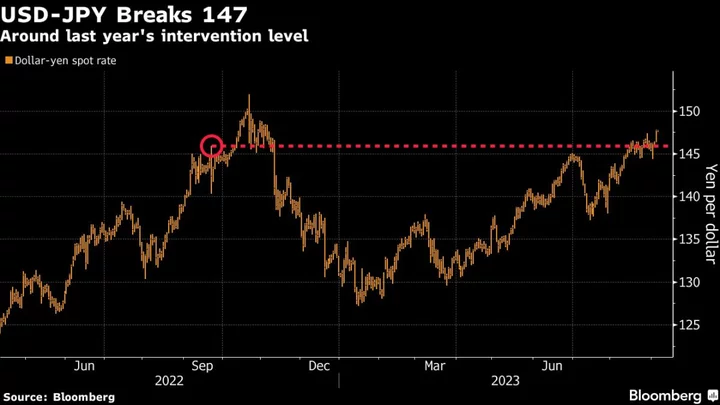Asian equity futures pointed to a cautious open for stock markets around the region on Wednesday after US shares fell and a rally in oil increased concern about inflation.
US Treasuries sank, adding to the downdraft, with yields pushing up across the curve as at least 40 businesses tapped high-grade markets around the world Tuesday.
Contracts for Hong Kong’s Hang Seng Index rose just 0.1%, those for Japan’s Nikkei 225 added 0.3% and futures for Australia’s S&P/ASX 200 slipped 0.2%. The S&P 500 ended below 4,500 Tuesday while an index of small caps slid about 2% and a gauge of homebuilders sank 5.5%.
The gains in oil are a headwind for much of Asia and put upward pressure on inflation, which in turn keeps policy interest rates high and drags on economic growth. Brent oil rose above $90 a barrel for the first time since November as the largest OPEC+ producers extended their supply cuts to year-end.
Meanwhile, the greenback weakened slightly early Wednesday after rising the previous session as US yields advanced, with the 10-year maturity approaching 4.3%. The surge in corporate debt issuance followed a seasonal slowdown and the recent rise in Treasury rates. About half of the corporate deals — or over $36 billion of new bonds — were sold in the US.
The yen strengthened about 0.2% after Japan’s top currency official, Masato Kanda, said he wouldn’t rule out any options if currency moves continue. The yen and the currencies of Australia and New Zealand fell to fresh 2023 lows on Tuesday. The yen is already trading at levels that saw Japan intervene in the market last year.
The yuan is also likely to be in focus as China tries to address its slide amid broad concerns over the nation’s economic health.
Investors in Asia will be watching for gross domestic product data from Australia Wednesday, consumer price index figures in Taiwan and a speech from Bank of Japan board member Hajime Takata. More broadly, they are also looking to this month’s key economic data from the US and clues as to the Federal Reserve’s next rate decision.
Fed Governor Christopher Waller said policymakers can afford to “proceed carefully” with tightening given recent data showing inflation continuing to ease. “There is nothing that is saying we need to do anything imminent anytime soon,” Waller told CNBC. Meantime, Fed Bank of Cleveland President Loretta Mester said the central bank may need to raise rates “a bit higher,” but stopped short of saying what officials should do at their next meeting.
“The Fed is sailing in shallow waters in a thick fog,” said David Kelly, chief global strategist at J.P. Morgan Asset Management. “It should be moving very slowly and be ready to halt or reverse its monetary tightening.”
Goldman Sachs Group Inc. now sees a 15% chance the US will slide into recession, down from 20% previously as cooling inflation and a still-resilient labor market suggest the Fed may not need to raise interest rates any further.
JPMorgan Chase & Co.’s Marko Kolanovic reiterated Tuesday that investors should fade the artificial-intelligence induced stock-market rally, arguing that he would turn more optimistic on equities if interest rates begin falling globally in the near term. Meantime, Morgan Stanley’s Michael Wilson said US equity investors are in for disappointment as economic growth is set to be weaker than expected this year.
Key events this week:
- Eurozone retail sales, Wednesday
- Germany factory orders, Wednesday
- US trade, ISM services index, Wednesday
- Canada rate decision, Wednesday
- Bank of England Governor Andrew Bailey testifies to the UK parliament’s Treasury Select Committee, Wednesday
- Federal Reserve issues Beige Book economic survey, Wednesday
- Boston Fed President Susan Collins speaks, Wednesday
- Dallas Fed President Lorie Logan speaks, Wednesday
- China trade, forex reserves, Thursday
- Eurozone GDP, Thursday
- US initial jobless claims, Thursday
- Bank of Canada Governor Tiff Macklem to speak on the Economic Progress Report, Thursday
- Atlanta Fed President Raphael Bostic speaks, Thursday
- New York Fed President John Williams participates in moderated discussion at the Bloomberg Market Forum, Thursday
- Japan GDP, Friday
- Germany CPI, Friday
- US wholesale inventories, consumer credit, Friday
Some of the main moves in markets:
Stocks
- S&P 500 futures were little changed as of 8:18 a.m. Tokyo time. The S&P 500 fell 0.4%
- Nasdaq 100 futures fell 0.1%. The Nasdaq 100 rose 0.1%
- Nikkei 225 futures rose 0.3%
- Australia’s S&P/ASX 200 Index futures fell 0.2%
- Hang Seng Index futures rose 0.1%
Currencies
- The Bloomberg Dollar Spot Index was little changed
- The euro was little changed at $1.0725
- The Japanese yen rose 0.2% to 147.47 per dollar
- The offshore yuan was little changed at 7.3030 per dollar
- The Australian dollar was little changed at $0.6378
Cryptocurrencies
- Bitcoin rose 0.3% to $25,778.61
- Ether rose 0.2% to $1,632.4
Bonds
- The yield on 10-year Treasuries advanced eight basis points to 4.26%
- Australia’s 10-year yield advanced three basis points to 4.17%
Commodities
- West Texas Intermediate crude rose 0.2% to $86.86 a barrel
- Spot gold was little changed
This story was produced with the assistance of Bloomberg Automation.
--With assistance from Rita Nazareth.

